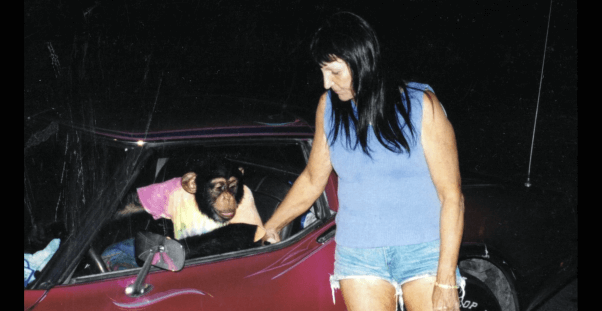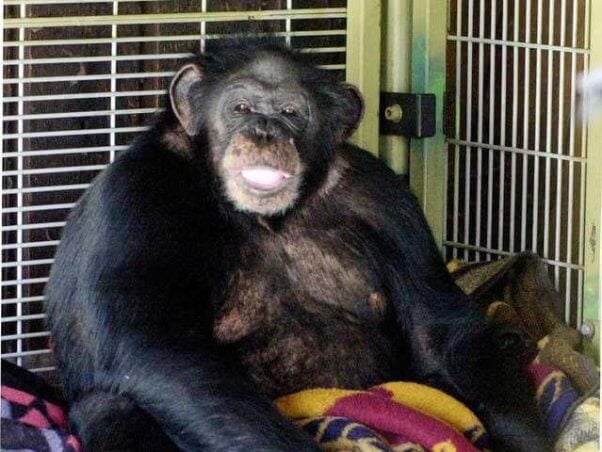Episode 2 of ‘Chimp Crazy’ Looks Back at a System That Failed Travis the Chimpanzee
In 2009, Travis the chimpanzee was at the center of a media frenzy when he nearly fatally attacked Charla Nash, a friend of the woman who kept him as a “pet.” The attack left Nash severely and permanently disfigured—and another individual dead.
The harrowing story that took the nation by storm more than a decade ago—and allegedly inspired a scene in Jordan Peele’s Nope—has resurfaced in episode two of Chimp Crazy, the latest docuseries from the director of Tiger King.
Who Was Travis the Chimpanzee?
Sandra Herold purchased Travis as an infant from the Missouri Primate Foundation to keep him as a “pet” in her Stamford, Connecticut, home. Unlike chimpanzees in nature, Travis didn’t spend his formative years climbing trees, foraging for food, making nests in tree beds, or communicating with his fellow apes. He rode shotgun in Herold’s tow truck, did household chores, and sat at a table for dinner.

Predictably, though, when Travis matured, his behavior changed. As viewers of Chimp Crazy will learn, the events that led to the 2009 attack should have prompted intervention from authorities.

In 2003, Travis bolted out of Herold’s car and ran loose for two hours after someone threw trash at him. An animal control officer warned the Herolds that keeping Travis wasn’t safe—but no action was taken. Instead, the family stopped bringing Travis out in public. They kept him in their home, where he didn’t get any exercise and instead watched television, ate junk food, and played on the computer. At 14 years old, Travis was 240 pounds—which is considered morbidly obese for a chimpanzee.
Chimp Crazy Looks Back at an Incident That Never Should Have Happened
Travis’ story still serves as a cautionary tale about the serious dangers of confining highly intelligent and social apes to human homes.
In 2009, the world saw the gruesome consequences of Herold’s failure to send Travis to an accredited sanctuary—and the failure of authorities to take preventive action. An apparently agitated Travis viciously attacked Nash, ripping her hands and face off. Police later shot Travis.
What Is the Captive Primate Safety Act?
Chimp Crazy has kicked off a wave of support for legislation introduced by Sen. Richard Blumenthal (D-Conn.) that would help prevent tragedies like those of Travis and other exploited chimpanzees featured in the docuseries. The bipartisan Captive Primate Safety Act, cosponsored by Sen. Chris Murphy (D-Conn.), would ban the private ownership, breeding, and commercial trade of primates.
Chimpanzees, monkeys, and other primates who are kept as “pets” suffer. Dealers often breed them in captivity, tear them from their protective mothers as babies, and sell them to anyone with a big enough bank account. PETA’s work has ended the use of chimpanzees in films, and now we’re aiming to ensure that no more great apes are exploited in the pet trade.
You can take action by contacting your federal legislators and urging them to cosponsor the bipartisan Captive Primate Safety Act:
Please also take action for Bow—the last solitary chimpanzee held in a private home in the U.S.:
What Happened to Travis the Chimpanzee?
Episode two of Chimp Crazy dropped on August 25 on Max. Watch the trailer below, and stream the series today:
Note: PETA supports animal rights and opposes all forms of animal exploitation and educates the public on those issues. PETA does not directly or indirectly participate or intervene in any political campaign on behalf of or in opposition to any candidate for public office or any political party.

